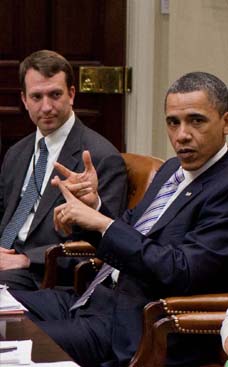
After talking with returned Peace Corps volunteers like Savané recently, I walked away with a sense that they pitied those of us who had never dared to stretch beyond our comfort zones. There was nothing evil or arrogant about it. They simply know something we don't. What that seems to be is knowledge of how flexible humans can be, how adaptable we should be, and how that helps cultures blend more peacefully. The Peace Corps isn't about things. It's about people.
Returned Peace Corps volunteers Angene and Jack Wilson of Lexington wrote a book on fellow Kentucky volunteers' experiences
Book is by and about Kentuckians who served in the Peace Corps
By Merlene Davis - Herald-Leader columnist
Posted: 12:00am on Feb 23, 2011; Modified: 8:19am on Feb 23, 2011
Caption: Returned Peace Corps volunteers Angene and Jack Wilson of Lexington wrote a book on fellow Kentucky volunteers' experiences. Photo: Pablo Alcala
We soon will mark the 50th anniversary of the Peace Corps, that idealistic program whose purpose was to send young people throughout the world to bring peace through friendship. The volunteers would learn more about the various cultures of the world, and the world would learn about us.
Lexington residents Angene and Jack Wilson, authors of the forthcoming Voices From the Peace Corps: Fifty Years of Kentucky Volunteers, talked with dozens of returned volunteers in Kentucky and allowed them to speak of the effects the corps has had on their lives and they had on the lives of others.
The common thread seems to be that the people whose lives the volunteers intended to improve brought a greater transformation to the volunteers' lives instead.
Perhaps that is why the Peace Corps has endured for half a century.
On March 1, 1961, President John F. Kennedy signed an executive order that launched the group, believing peace would blossom if Americans interacted more completely with people of different cultures.
Early on, the volunteers were sent to Africa, Asia and South America to teach school, construct buildings, dig wells and empower villagers to do for themselves.
But why did they go?
For Angene Wilson, who was assigned to Liberia with her husband, Jack, from 1962 to 1964, "I think it was probably the call of Kennedy, but we wanted to do something. It was the adventure, and we were interested in the rest of the world and an opportunity to do something."
Lexington's Rachel Savané, who served in Guinea in West Africa from 1990 to 1992, said she wanted a challenge. She had lived for a year in Denmark while in college, but that was too easy.
Living in Bangouya, Guinea, with no electricity or running water, gave her more challenges than she asked for.
"Because I was living in a village, I was like a baby," Savané said. "I had to learn to feed myself, using my hands, and I had to learn a different hygiene method.
"It was like being brand new. I had to bring my own water from the well."
Her assignment was to "find something to do with the health center there or the local democratically elected government."
She was able to secure two grants that enabled the health center to increase its staff and include a pharmacy, and to have hospital midwives teach village midwives newer techniques.
"I had to find something in my comfort zone that would be of assistance," she said. "They had to be finite projects that did not require finishing when you were gone, because they would not happen."
'It is the human being that counts'
After talking with returned Peace Corps volunteers like Savané recently, I walked away with a sense that they pitied those of us who had never dared to stretch beyond our comfort zones. There was nothing evil or arrogant about it. They simply know something we don't.
What that seems to be is knowledge of how flexible humans can be, how adaptable we should be, and how that helps cultures blend more peacefully. The Peace Corps isn't about things. It's about people.
Angene Wilson, professor emeritus at the University of Kentucky in the department of education, quotes an Akan proverb from Ghana: "It is the human being that counts. I call gold; it does not answer. I call cloth; it does not answer. It is the human being that counts."
That is the secret that returned volunteers know. The good part is they are willing to share it with the rest of us.
Jack Wilson said the couple wrote the book because "I wanted (people) to know there are other ways to serve your country. You can't survive without changing a little bit, without learning a country, without learning some of the language."
The book emerged from an effort by the Wilsons in 2004 to document the stories of returned volunteers in Kentucky for the Louie B. Nunn Center for Oral History Project at UK.
By 2008, they had interviewed 86 returned volunteers and staff, and two others had interviewed 14 people who had served from 1960 through early 2000.
Voices allows volunteers to elaborate on the reasons they joined and lets them discuss their training, adjustments to living overseas, jobs, the friends they made, and their readjustment upon returning home.
If the book is successful, some proceeds will be used to fund Peace Corps projects in other countries, Angene Wilson said.
'They can do things like this'
The Wilson have maintained friendships forged in Suehn, Liberia, hosting the son of a friend who was attending Berea College.
Last year, the couple attended a reunion in Suehn and saw the devastation war had brought to the area, including the destruction of the National Baptist Mission school where they had taught and where Jack once coached a championship basketball team.
The Peace Corps pulled out of Liberia during the war but returned in July.
After their tour in Liberia, the couple lived in Sierra Leone and Fiji while Jack was a Peace Corps assistant director.
They are often asked about their time abroad, Angene Wilson said, "but they don't really want to know. They want you to say it was fine."
But volunteers really want to talk about those years. "For some of these people, it was an opportunity to have an audience with someone who would understand," Jack Wilson said.
The book allows volunteers to talk, too, of the bad times - times when they witnessed death up close for the first time, he said, or when they wondered what had happened to the families they had left there. They question if they really made a difference.
It is a truer picture of the Peace Corps from the volunteers' perspective than many of us will ever see.
"We hope that this book gets in every middle school and high school library," Angene Wilson said, "and that kids read it and know that these things have happened and that they can do things like this.
"The book is dedicated to people who taught us how to be citizens of the world."
Reach Merlene Davis at (859) 231-3218 or 1-800-950-6397, Ext. 3218, or mdavis1@herald-leader.com.















